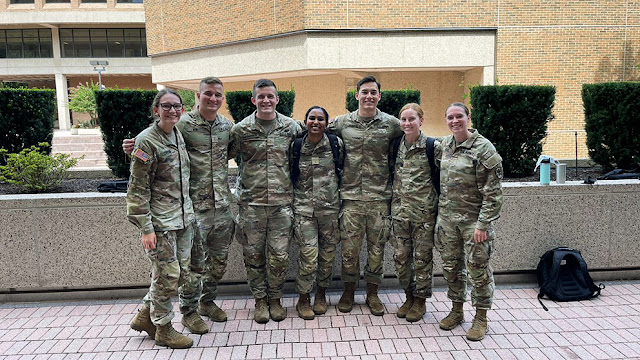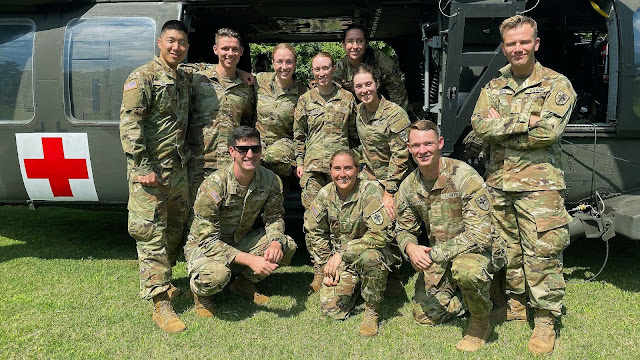Students and Faculty Take a Retrospective Look at the Start of Medical School
By Vivian Mason
“I’ve wanted to be a doctor since I was in high school,” says U.S. Air Force 2d Lt. Pallavi Malladi, a first-year medical student at USU. “I am thrilled to finally be here.”
Starting medical school can be exciting, but also demanding and intimidating. Students typically enter medical school with a rough understanding of the trials ahead, and their possible effects on their emotional, physical, and psychological well-being. However, until they are fully immersed in the process, students can’t fully comprehend what the experience will be like. As reported by many, “Balance is something that students must begin to learn starting day one of medical school and modify throughout their career.”
Student expectations can include issues with academics, time management, self-motivation, family obligations, work–life balance, relocation, etc. There are always the hopeful expectations versus the tough realities of medical school life.
Three USU students share the expectations they held for their first year, while two module directors also weigh in with their perspectives.
2nd Lt. Pallavi Malladi
U.S. Air Force, Medical Student, Class of 2026
For me, this transition period was primarily about settling in, becoming comfortable in uniform, and learning what it means to be an officer and student at the same time. It’s all about navigating these new roles.
I think Officer Training School did a great job preparing newly-commissioned officers for the military environment. The course showed us what military life looks like, how we must always carry ourselves with integrity, and the value of lifelong discipline. I plan to work on these principles throughout and beyond USU.
 |
| 2nd Lt. Malladi (second from left) and her flight mates at Officer Training School in Maxwell, AL. (Photo courtesy of 2nd Lt. Pallavi Malladi) |
Part of studying at USU is also developing as military medical leaders. We saw how the MS4s [fourth-year medical students] had developed throughout their military education at Operation Bushmaster. The stress, mass casualty situations, and the mock deployed environment did not stop them from operating their platoons efficiently and providing patient care with limited medical resources. I am very excited to get to that point over the next few years.
All of this is still very new to me, but I’m enjoying it immensely. Some days are fine, and some days are tough. But, I’m staying organized, taking care of my physical and mental health, and enjoying time with my wonderful classmates and future doctors.
Thomas Flagg, Ph.D.
Associate Professor, Department of Anatomy, Physiology, and Genetics
Module Co-Director, Foundation in Medicine
Our job is to help get students acclimated to the rhythm and pace of academic life and the USU environment that will be a major focus of their lives for the next 14 months or so.
 |
One thing that often comes as a bit of a shock to students as they begin medical school is the pace at which things occur academically. That’s something the students really have to adjust to. The volume of material and the pace at which it is delivered are much faster than they’re probably accustomed to. Students have to learn to budget their time and learn how to stay on top of things.
We also try to design activities that have students work together in groups so they get to know each other. We hope that this helps build peer-to-peer academic support groups and lifelong friendships.
During orientation, and throughout the module, we let students know that we are here to help them be successful. Our job is also to help them become doctors. I think early on there’s some reticence from a lot of students to ask questions. This starts to change after the first exam. Then, students learn to better understand the expectations. Students who do poorly and even students who do well begin to figure out how to optimize their time better, how to adjust their study habits, and how to pick up the pace.
My goal is for 100% of the students to pass. We offer an open environment that helps them to feel as comfortable as possible when asking for help. We emphasize this message at various points along the way, particularly after midterm exams.
Faculty is a resource for students, and they should take advantage of that. If a student goes to a faculty member with one question, they’re usually going to leave with answers to about eight other questions that they didn’t even know they had. That’s an important part of the curriculum. It’s become even more important now that we’ve shifted to a model of recorded lectures.
2nd Lt. Michael Ainsworth
U.S. Army, Medical Student, Class of 2026
Based on how medical school’s going so far, I expect to be doing a good deal of studying, watching online lectures, and applying what we learn in lectures and videos into necessary skills for the future. I’m expecting a lot more of that as we go forward.
I’m not surprised by the amount of time I have to invest in learning this material. Sometimes, as an undergraduate, you can get away with brute memorization. In the Foundation module, we were actually connecting systems. It doesn’t matter merely to memorize what the cell types are or learn the pathology or histology. It matters how it all connects and how it works together with the rest of the body because that’s what we’re going to be building on.
 |
| 2nd Lt. Michael Ainsworth (third from left) at orientation with other recent West Point graduates now attending USU. (Photo courtesy of 2nd Lt. Michael Ainsworth) |
I think I’ve been prepared to adapt pretty well to this environment because of my West Point training. I find that I can study a bit more and become comfortable with the material because I was so used to the structure there.
I want to do well. For me, grades aren’t as important as understanding. In medical school, it’s important to understand the material. It’s not just about memorizing it and passing the test. I’ve tried to embody that a lot more. As a goal, I want to be able to look at myself and say, “Yes, I actually understand this” not only as a concept, but also in practice.
Colonel (Dr.) Renee Mallory, U.S. Army
General Internist and Assistant Professor of Medicine
Department of Medicine, Division of Military Internal Medicine
Module Co-Director, Foundation in Medicine
The students in the class of 2026 have been doing more virtual remote learning than any of the other previous classes, which presents a unique challenge. On top of that, in medical school, it’s no longer good enough to simply learn the information and memorize it. Now, it’s about getting a more in-depth understanding and applying that information to new situations and scenarios.
The first few months of medical school largely consist of the basic sciences. Trying to connect the application of the basic sciences to practicing medicine is a critical element of the module. It can sometimes feel a bit disparate from what students classically think about as “medical school,” where they’ll be studying anatomy, seeing patients, and learning about organ systems and diseases.
We try to help students understand that these basic and foundational sciences are critical for them to grasp early on so they can apply them as they move forward through the subsequent modules. The Foundation module is important, even though it might not feel like what they initially envisioned as a typical medical school curriculum.
We’re also trying to be more deliberate about encouraging lifelong learning and self-directed learning. We want to help students look for opportunities to learn more and to ask themselves the how and why questions to get a deeper understanding of the material. So, my approach for this year is to get them prepared for the coming modules and establish solid study strategies.
I encourage students to start with what they know and how they typically learn. The joy of this job is working with students and helping them to shape that a little more so that they can handle the volume and speed with which the information is coming at them. It’s quite a transition for many students.
The big message that Dr. Flagg and I try to impart is if there’s anything going on and the students need help, we want them to reach out to us without hesitation or delay. We try to connect students to whatever help they need. If they don’t know who to ask, start with us and if we can’t provide the support necessary we can help direct them from there.
As faculty, it’s important to remain flexible and acknowledge that things happen, and we need to leave room for those circumstances and provide support as needed. It’s helpful for students to know that there are people here who sincerely want to help them, and they can reach out to us at any time.
2nd Lt. Patrick Brandenburg
U.S. Army, Medical Student, Class of 2026
 |
| 2nd Lt. Patrick Brandenburg says medical school has been more of a balancing act than he's used to, but he celebrates the small victories. (Photo credit: Tom Balfour, USU) |
I try to set aside a few hours per day of personal time where I’m not worrying about school. I think it’s extremely important to do things that you enjoy on a daily basis in order to stay motivated and avoid burnout. There are definitely some days when this isn’t possible; but, for the most part, it’s been doable.
As far as studying goes, I just try to take it one day at a time. After I finished my first module, and alongside learning the material, I also learned which study methods work best for me. If I’m feeling ambitious, I sometimes try to use the weekends to get ahead. Otherwise, my main goal is just not to fall behind.
During orientation, it was made very clear to us that we are never alone and that we shouldn’t hesitate to reach out if we’re feeling overwhelmed. For me, my main support has been my peers. I do most of my studying alone, but every now and then it’s nice to study with a group of friends. It’s good to have people to discuss the material with and to be able to lean on (or commiserate with) them when you don’t understand something.
Another thing that helps me stay sane is celebrating the small victories. For example, finally remembering that pesky Anki card that you’ve gotten wrong for a week in a row or getting a 5/5 on a pathology quiz. I know I’m never going to learn all the information that’s thrown at me, but small victories like that help to remind me that I am always learning.


